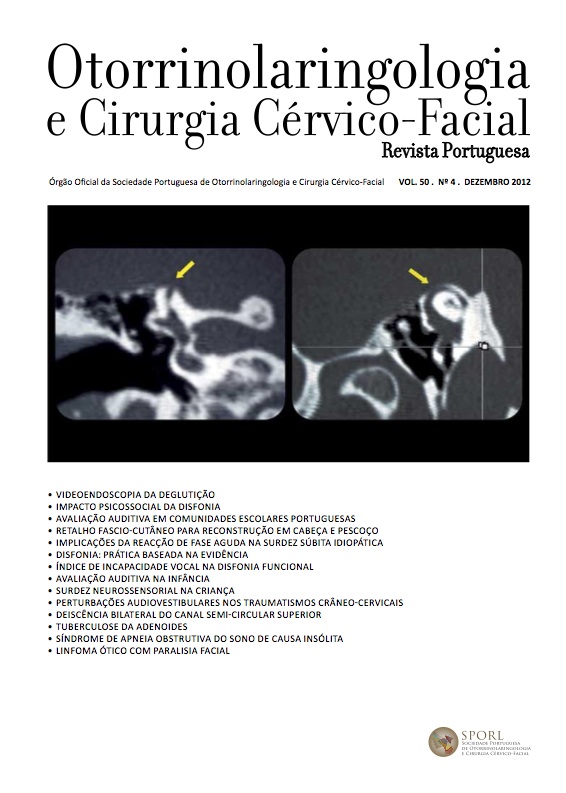Otoneurologia Geriátrica: Conceitos antigos, desafios atuais
DOI:
https://doi.org/10.34631/sporl.1013Palavras-chave:
Geriatria, Otologia, Otoneurologia, EnvelhecimentoResumo
Objetivo: determinar o impacto das queixas otoneurológicas na referenciação de idosos à consulta de otorrinolaringologia.
Métodos: Estudo retrospetivo observacional incluindo doentes com idade igual ou superior a 65 anos, referenciados dos Cuidados de Saúde Primários para Otorrinolaringologia durante 2019 e 2020. Informação relativa aos sintomas subjacentes à referenciação foi colhida do P1.
Resultados: 1304 doentes foram incluídos neste estudo. 65% (n= 852) referiu sintomatologia otoneurológica como um dos motivos para a referenciação. A hipoacusia foi o sintoma mais reportado (69%, n=592), seguida de acufeno (36%, n=304) e vertigem/tontura/desequilíbrio (25%, n=213). Objetivou-se uma associação estatisticamente significativa entre hipoacusia e idade (p< 0.001) e entre o género feminino e vertigem (p< 0.001) e acufeno (p= 0.007). Entre todos os doentes, a presbiacusia foi o diagnóstico mais comum.
Conclusões: Este estudo solidifica as queixas otoneurológicas como centrais nesta população, destacando a importância da preparação dos profissionais para a abordagem destes sintomas.
Downloads
Referências
Mirza N, Lee JY. Geriatric Otolaryngology. Otolaryngol Clin North Am. 2018 Aug;51(4):xvii-xviii. doi: 10.1016/j.otc.2018.04.002.
Chiu BL, Pinto JM. Aging in the United States: opportunities and challenges for otolaryngology-head and neck surgery. Otolaryngol Clin North Am. 2018 Aug;51(4):697-704. doi: 10.1016/j.otc.2018.03.001.
INE. Estatísticas Demográficas 2019. Portal do Instituto Nacional de Estatística [Internet]. Lisboa: Instituto Nacional de Estatística; 2020. Available from: http://www.ine.pt/
Eibling D, Kost K. The emerging field of geriatric otolaryngology. Otolaryngol Clin North Am. 2018 Aug;51(4):847-852. doi: 10.1016/j.otc.2018.03.011.
Kost KM. Geriatric otolaryngology: why it matters. Clin Geriatr Med. 2018 May;34(2):ix-x. doi: 10.1016/j.cger.2018.02.001.
Creighton FX Jr, Poliashenko SM, Statham MM, Abramson P, Johns MM 3rd. The growing geriatric otolaryngology patient population: a study of 131,700 new patient encounters. Laryngoscope. 2013 Jan;123(1):97-102. doi: 10.1002/lary.23476.
Özler GS, Yengil E. Why do geriatric patients visit otorhinolaryngology? Ear Nose Throat J. 2016 Jun;95(6):224-9.
Patel R, McKinnon BJ. Hearing loss in the elderly. Clin Geriatr Med. 2018 May;34(2):163-174. doi: 10.1016/j.cger.2018.01.001.
Oliveira A, Nossa P, Mota-Pinto A. Assessing functional capacity and actors determining functional decline in the elderly: a cross-sectional study. Acta Med Port. 2019 Oct 1;32(10):654-660. doi: 10.20344/amp.11974.
Mamo SK, Nirmalasari O, Nieman CL, McNabney MK, Simpson A, Oh ES. et al. Hearing care intervention for persons with dementia: a pilot study. Am J Geriatr Psychiatry. 2017 Jan;25(1):91-101. doi: 10.1016/j.jagp.2016.08.019.
Wallis S, Atkinson H, Coatesworth AP. Chronic otitis media. Postgrad Med. 2015 May;127(4):391-5. doi: 10.1080/00325481.2015.1027133.
Shinnabe A, Hara M, Hasegawa M, Matsuzawa S, Kanazawa H, Yoshida N. et al. Clinical characteristics and surgical benefits and problems of chronic otitis media and middle ear cholesteatoma in elderly patients older than 70 years. Otol Neurotol. 2012 Sep;33(7):1213-7. doi: 10.1097/MAO.0b013e31825f24ba.
Neuhauser HK. The epidemiology of dizziness and vertigo. Handb Clin Neurol. 2016;137:67-82. doi: 10.1016/B978-0-444-63437-5.00005-4.
Alyono JC. Vertigo and dizziness: understanding and managing fall risk. Otolaryngol Clin North Am. 2018 Aug;51(4):725-740. doi: 10.1016/j.otc.2018.03.003.
Barin K, Dodson EE. Dizziness in the elderly. Otolaryngol Clin North Am. 2011 Apr;44(2):437-54, x. doi: 10.1016/j.otc.2011.01.013.
Woollacott M, Shumway-Cook A. Attention and the control of posture and gait: a review of an emerging area of research. Gait Posture. 2002 Aug;16(1):1-14. doi: 10.1016/s0966-6362(01)00156-4.
De Stefano A, Dispenza F, Suarez H, Perez-Fernandez N, Manrique-Huarte R, Ban JH, et al. A multicenter observational study on the role of comorbidities in the recurrent episodes of benign paroxysmal positional vertigo. Auris Nasus Larynx. 2014 Feb;41(1):31-6. doi: 10.1016/j.anl.2013.07.007. Erratum in: Auris Nasus Larynx. 2014 Jun;41(3):325.
Ernst A, Basta D, Mittmann P, Seidl RO. Can hearing amplification improve presbyvestibulopathy and/or the risk-to-fall? Eur Arch Otorhinolaryngol. 2021 Aug;278(8):2689-2694. doi: 10.1007/s00405-020-06414-9.
Soto-Varela A, Rossi-Izquierdo M, Del-Río-Valeiras M, Vaamonde-Sánchez-Andrade I, Faraldo-García A, Lirola-Delgado A. et al. Presbyvestibulopathy, comorbidities, and perception of disability: a cross-sectional study. Front Neurol. 2020 Oct 30;11:582038. doi: 10.3389/fneur.2020.582038.
Agrawal Y, Van de Berg R, Wuyts F, Walther L, Magnusson M, Oh E. et al. Presbyvestibulopathy: diagnostic criteria consensus document of the classification committee of the Bárány Society. J Vestib Res. 2019;29(4):161-170. doi: 10.3233/VES-190672.
Baguley D, McFerran D, Hall D. Tinnitus. Lancet. 2013 Nov 9;382(9904):1600-7. doi: 10.1016/S0140-6736(13)60142-7.
Jafari Z, Kolb BE, Mohajerani MH. Age-related hearing loss and tinnitus, dementia risk, and auditory amplification outcomes. Ageing Res Rev. 2019 Dec;56:100963. doi: 10.1016/j.arr.2019.100963.
Araujo T de M, Iório MC. Effects of sound amplification in self-perception of tinnitus and hearing loss in the elderly. Braz J Otorhinolaryngol. May-Jun 2016;82(3):289-96. doi: 10.1016/j.bjorl.2015.05.010.
Simpson RB, Nedzelski JM, Barber HO, Thomas MR. Psychiatric diagnoses in patients with psychogenic dizziness or severe tinnitus. J Otolaryngol. 1988 Oct;17(6):325-30.
Downloads
Publicado
Como Citar
Edição
Secção
Licença
Direitos de Autor (c) 2022 Os autores mantêm os direitos de autor deste artigo.

Este trabalho encontra-se publicado com a Licença Internacional Creative Commons Atribuição-CompartilhaIgual 4.0.






